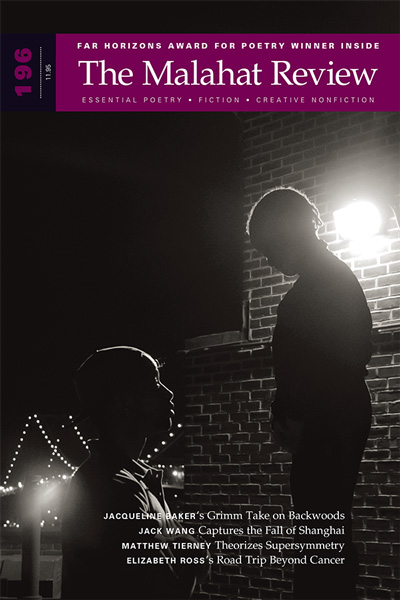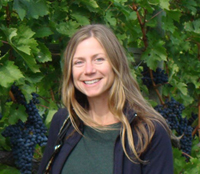Synesthetic Language:
Samantha Ainsworth in Conversation with Yusuf Saadi

Malahat poetry board member Samantha Ainsworth talks with Far Horizons Poetry Contest winner Yusuf Saadi about his poem, "The Place Where Words Go to Die." Saadi's poem was chosen from over 500 entries by contest judge Steven Heighton, who called the poem "a dynamic elegy for both words and the world [that] moves seamlessly between different conceptual, emotional, stylistic, and linguistic registers. An impressively-controlled, richly allusive performance."
See the full announcement page for Yusuf Saadi's contest win.
First, congratulations on winning The Malahat Review's Far Horizons Poetry Award, and right on the heels of your poem, "Reading Borges on the Moon" being published in Issue 195 of The Malahat Review.
Your winning poem, "The Place Where Words Go to Die" sizzles like a battery on the tongue. When did you first recognize or learn of language's ability to spark the senses?
I can't remember a specific moment where I had an epiphany that language can "spark" the senses, but I think all of us have an intuitive sense that language is synesthetic; everyone who reads literature experiences at some point that spine-quiver when a line, word, or passage resonates with you. Words aren't only signification in an intellectual sense; not only does the word's "idea" overlap with our senses, but we know that a word has a material form, a body, that we can connect with our own bodies. If you slowly read a line as simple as "she splashed cold water on her face," you can feel the cold water there, almost. There is a relationship between our imagination at work when we read and our imagination at work in our sense perception of the ordinary physical world.
Give us a peek into Yusuf Saadi and your method of birthing a poem. Which comes first, the poet or the poem?
I don't feel as if I have a method for writing a poem; almost every time I begin writing a draft, it goes quite badly, and I have to struggle with the poem and with my insecurity/anxiety. For this poem in particular, I had difficulty moving beyond the first stanza. I knew the first several lines for quite some time: "Primifluous was there and wandered murk-eyed / in the river's bones." I walked around with those lines in my head for over a year. I think it's a strong beginning, and the rest of the poem is simply an attempt to live up to the momentum that it creates; hopefully the poem succeeds to some degree. And, while it might not manifest clearly in the poem, I had Dante and Eliot (and Derek Mahon) in my head at the time when I was writing most intensely. I'm also blessed to have friends who gave me great edits and advice through the revision process. If I include minor edits, I had over 23 drafts for this poem. But again, I don't feel I have a method; every poem is different and requires a different response to dealing with the anxiety of first drafts.
The winning poem dances with mixed diction, straddles a space and connects the old and the new. Some of your poem's words, like "primifluous" are dangerously close to extinction or in today's standards are nearly obsolete. This poem seems to be a eulogy to all words dead and dying.
I didn't intend for the poem to make a specific point or argument about linguistic extinction — I simply liked the image of some of these beautiful words ("primifluous" for example) dying and being reborn in a type of underworld exclusively for language. I wanted to begin with an almost hellish setting and move from there, with the words constructing the world and poem as they go. I also wanted to emphasize the idea of the words as bodies, as material things, as I alluded to in my response to the first question. The words, like bodies, can be burned, crucified and reincarnated. The words have a sense of agency; they use humans as vessels in a symbiotic relationship with us.
Despite this poem's tone of death and loss, there remains a "seize the day" element to it. Hope lurks. Can you expand on this? What were your reasons for including certain words or text abbreviations like the acronym #yolo?
The poem not only portrays the death of words, but also their reincarnation in new forms. As writers, especially as poets, we need to acknowledge the ways in which our relationships with language have fluctuated in our everyday world. Recently, the most prominent changes revolve around mishmashes within Internet and digital culture: texting, short form, abbreviation, slang, and access to discourses that likely would have remained isolated pre-Internet. These shifts have numerous effects: language is often further instrumentalized, sped-up, and combined in novel ways. The "texture" of words and rhythms i.e. how they interact with our bodies has changed (think of how fast we consume a text message compared to a line of poetry, and what this does to our brains). I don't frequently enjoy writing about these new forms of language; many of my poems focus on, let's call them, "elemental things"—the clouds, the moon, the sky (I probably should have been born in the 18th century), but it is almost irresponsible not to at least acknowledge these new appearances of language and their effects in our world, for good and bad. Given my poem's subject matter, I felt it necessary that these new forms of language enter the poem—thus, there is a "seize the day" element in the sense that the poem attempts to capture contemporary words in their various forms and energies and acknowledge their novelty, while also connecting them to the language of yore.
"The Place Where Words Go to Die" maintains its momentum; it gallops along while remaining within its metaphorical world, one in which words are personified. Never does it allow its reader to grow listless. Do you have the reader in mind when you write poetry?
Good advice that I received when I was younger was that you should write for the best reader you can imagine, which will be the best version of yourself (you can't write better than you can read). I think it's fine to challenge the reader, to make them work, and to reward their perseverance with good writing; yet, at the same time, you must be fair to your reader and ensure that the writing is engaging on at least a rudimentary level. Not all writing, especially not all poetry, makes sense on an intellectual plane on the first read through. But you need to provide something for the reader to cling to, whether it's a concrete image, a metaphor, a strong emotion, or even rhythms and vocabulary that lets the reader get word-drunk. I think I've gotten better as a reader over the past few years, but there are times when I read poetry that is so obscure it doesn't reward me on any level, and this usually turns me off.
What are you currently reading?
I just finished reading DeLillo's Underworld. I'm now reading several shorter works simultaneously including a collection of Marquez's novellas and a zany book called Flatland: A Romance of Many Dimensions. I'm also slowly translating Baudelaire from French to English, which is challenging, but fun. The best thing about not being in school is that you can read whatever you want (the worst thing being that you often have no one with whom to discuss what you read).
Apart from poetry, are there other forms of writing that you work within? If so, which genres do you most enjoy?
It's strange that I predominantly write poetry because I predominantly read fiction, and I grew up exclusively reading fiction. I do venture into short stories sometimes, although I find them very intimidating. They need the same laconicism as a poem, but they also require narrative and character arc. I've written and published one decent short story, and have abandoned several terrible ones. Lately, I've been working on a novella, called Composition, which offers its own challenges, but has been a rewarding experience that allows me to appreciate the unique beauties of writing prose. The longer prose form forces you to consider the macro elements—conceits, intersecting narrative lines—instead of only thinking about the work on a line-by-line level. I think I will always go back to the poem though, especially short poems; it's a wonderful feeling to have a petite, tight poem that you've edited for hours upon hours until you've reached the point where each word flaunts its necessity. (My favourite form is the sonnet. They are lovely little things.)
Have you any writing projects in the works or plans to do so?
I have my first Chapbook being published with Vallum soon, and I'm working to combine the poems I've written there and elsewhere into a full-length collection. I've also almost completed the first draft of my novella, which I'm happy with and will begin to revise shortly. Lastly, I'm an editor at an online literary magazine called Sewer Lid. These are my major projects at the moment. There are also several short stories that have been living in my head for a few years, and it would be nice to hatch them once I have the time; a lot of writing for me is simply expelling ideas from my brain so I can allow space for other ideas to coagulate. I've written bits and pieces of a novel, but I want to hold off from becoming too involved with it for at least a year or so because I think it will take over my life, and I'm not ready for that, yet.

Samantha Ainsworth
* * * * * * * *









